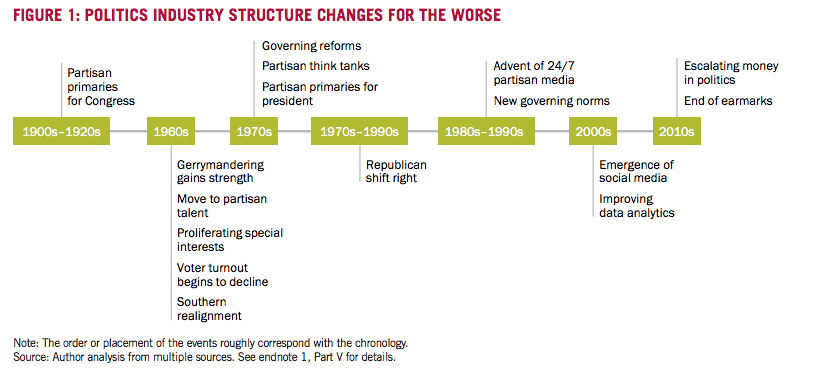Harvard professor has a novel way to fix Washington before 2018
Many market analysts have pointed to anticipation for tax reform as a driving factor of the market rise since Trump’s election day. But Michael Porter, who is widely seen as the father of modern business strategy, said he is “not optimistic” about the likelihood of any major legislation coming through under the current political framework.
In a new paper, Porter, along with political innovation activist and former CEO Katherine Gehl, explained that political reform will be necessary in order to push any meaningful legislation through. And, no, it’s not far-fetched, hey says.
The authors, who applied the tools of business analysis to American politics, said there is in fact a near-term solution to changing the political system, or what they call the “polarizing duopoly that is no longer serving Americans.”
Porter and Gehl explained that the current political system is a private industry that is structured around two parties but also includes other interest groups affected, including lobbyists, campaign consultants, think tanks, and the media.
“Most people think of politics as its own unique public institution governed by impartial laws dating back to the founders,” they said. “Not so. Politics is, in fact, an industry—most of whose key players are private, gain-seeking organizations.”
And they say that’s the reason true reform to the system is both necessary and plausible.
Immediate political action
Porter and Gehl explained that while calls for political reform are usually met with skepticism and concerns about the amount of time they would take, a “Senate fulcrum solution” is achievable by the 2018 mid-term election.
This solution, they explained, aims to elect three to five centrist independent US senators to act as a swing coalition and force change from the political center.
“This political invention could bring transformational change to the US Senate as soon as 2018 with a relatively small investment—sooner and for less cost than the longer-term structural reforms,” they said.
They added that while challenging, the plan is plausible because the number of seats required to deny either party a majority is small.
“Such a group—with a problem-solving agenda—would be large enough to deny either party an outright majority,” they said. “Depending on the policy issue, the coalition could then align with either party, or bring subsets of both parties together, to create a majority to pass legislation providing real solutions to our nation’s toughest challenges.”
They said this could be a near-term step that can be followed by other solutions involving more long-term initiatives by citizens, including moving to nonpartisan primaries and continued gerrymandering reform.
And those who think Trump’s “outsider” status will enact or enable real change are misguided, they explained.
“His election changes nothing about the fundamental rules of the game or the incentives that operate,” Gehl said. “The parties are incentivized to fight this war tit for tat in the duopoly… that’s why we aren’t see anything change.”
Meanwhile, they added, it is important to remember that much of what constitutes today’s political system—including political parties, political primaries, caucuses, ballot-access rules, and filibuster rules—has no basis in the Constitution, isn’t “sacred” and slows progress.
In fact, the industry has shifted over time—often altered by political actors looking to expand their influence. And many of these changes, laid out below, have changed incentive structures that limit productive solutions, they explained.

Political reform is key, the authors explain, because as long as political incentives are misaligned (as they currently are), there are limits to progress that works for the American people.
The ‘political industrial complex’
After all, “politics” in America is booming. From pollsters to consultants, and think tanks to media, interest is high. The “industry” is doing well but the people who are supposed to benefit from this “booming enterprise” (the American public) have never been more dissatisfied.

The authors add that politics is a textbook example of a duopoly, “an industry dominated by two entrenched players,” they said. “Around the two major parties, the Democrats and the Republicans has arisen what we call the ‘political industrial complex,’ an interconnected set of entities that support the duopoly.”
In fact, the long-list of culprits blamed—from special interests to big money to polarization to fake news—are just symptoms of the misaligned system.
“The real problem is that our political system is no longer designed to serve the public interest, and has been slowly reconfigured to benefit the private interests of gain-seeking organizations: our major political parties and their industry allies,” they said.
This can be shown by the increasing inability to get anything done, as shown in the chart below.

And this inability to get anything done—even on issues with bipartisan support like corporate tax reform and infrastructure investment—is hurting overall US competitiveness, Porter explained.
Even the handful of recent legislative wins have been pushed through with virtually no bipartisan support, a vulnerability that leaves them open for attack, as seen with the Affordable Care Act.

There is, in fact, bipartisan support for many key “pro-growth” agenda items, including corporate tax reform and infrastructure investments, as shown below.

But, at this point, Porter says his only hope of getting anything passed comes down to pressure from citizens.
“[Tax reform] is the single biggest game changer that would put our economy on a different path. Everybody understands that,” he said. “I can only hope and pray that the pressure from society is so great that his will break down this normal gridlock behavior. I’m hopeful but I can’t tell you that I’m optimistic.”
Nicole Sinclair is markets correspondent at Yahoo Finance
Please also see:
Expert: Breached Equifax data may have been used in fraud
15% of big US chain restaurant locations were in hurricane-exposed areas
How Apple can prevent the iPhone from going the way of the PC
DACA repeal will conservatively hit GDP by $105 billion over five years, Mark Zandi says

